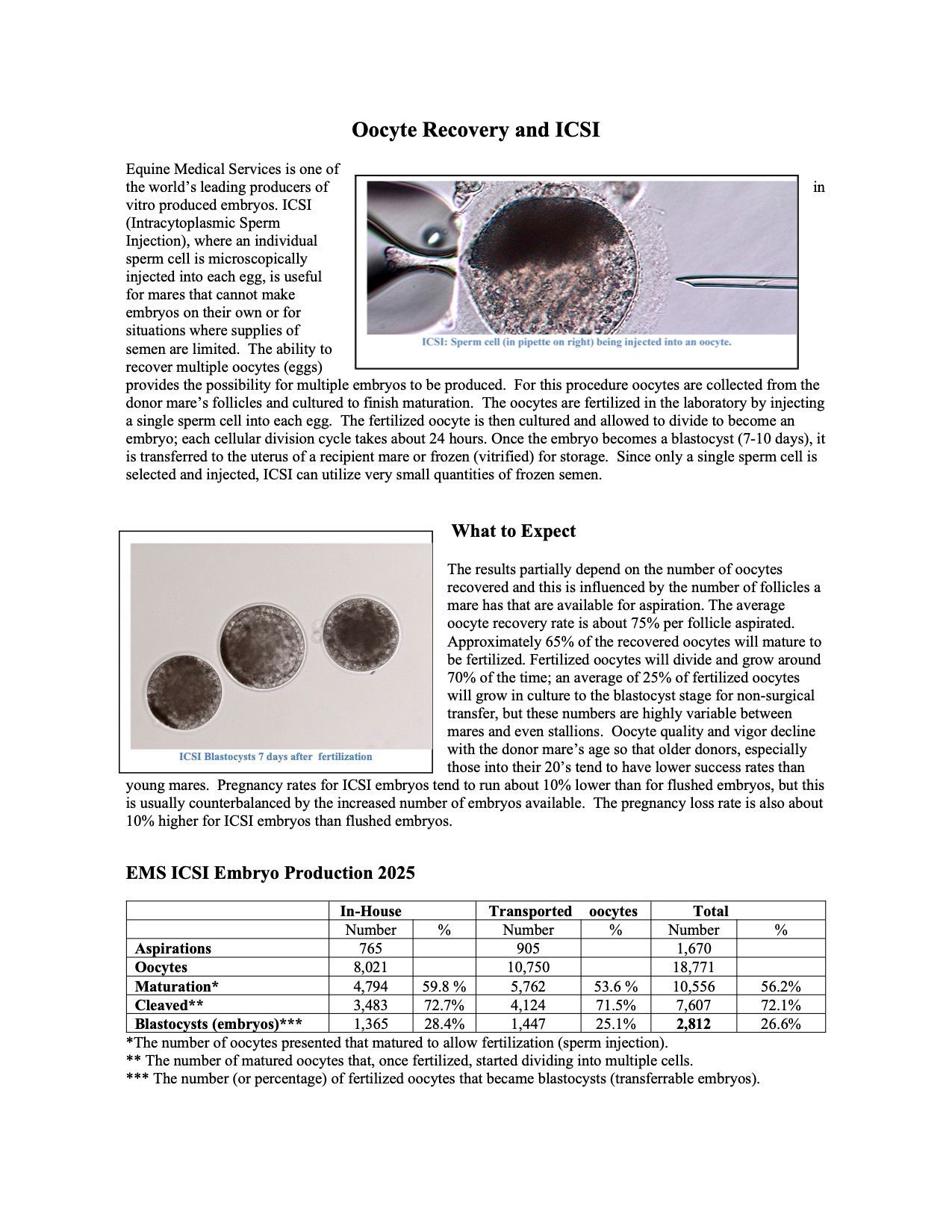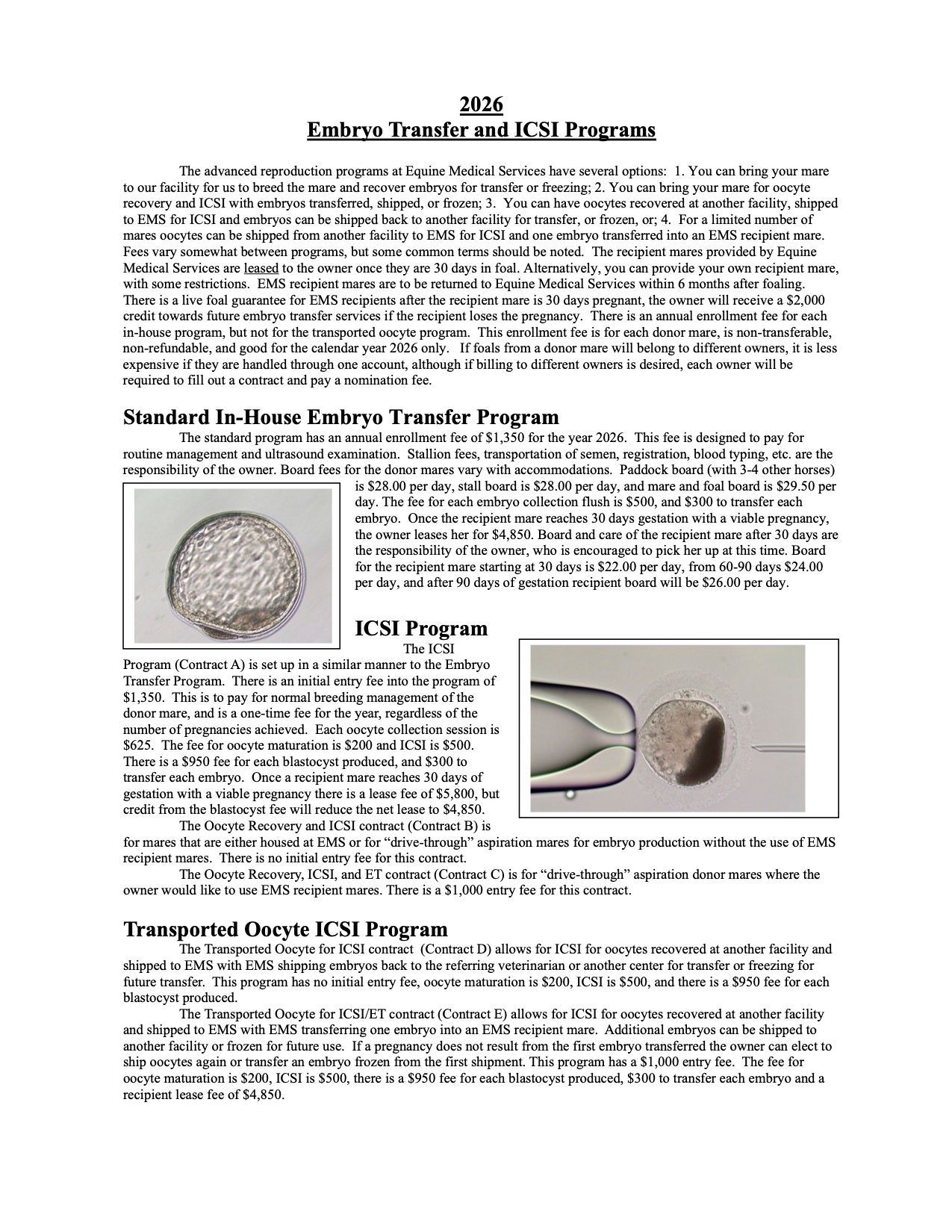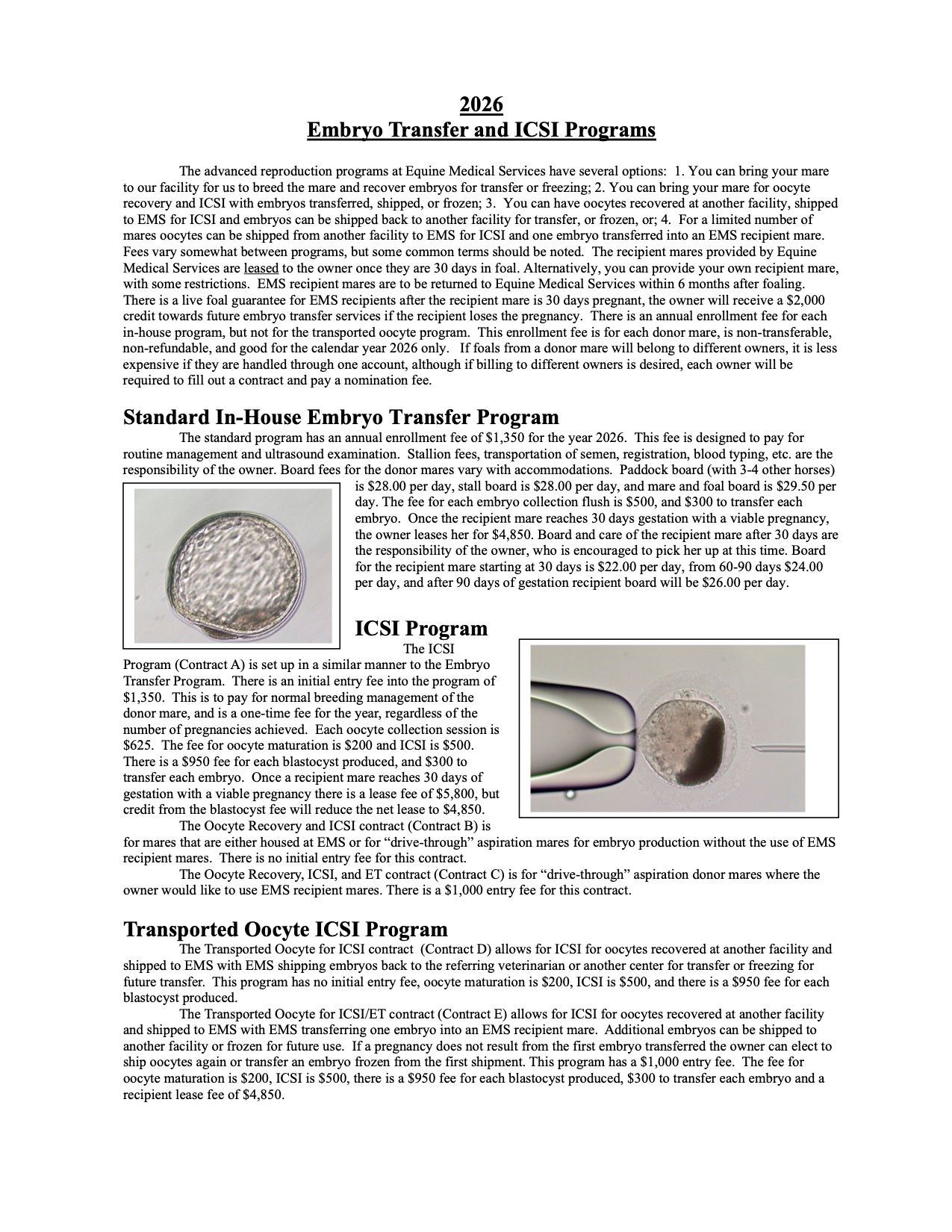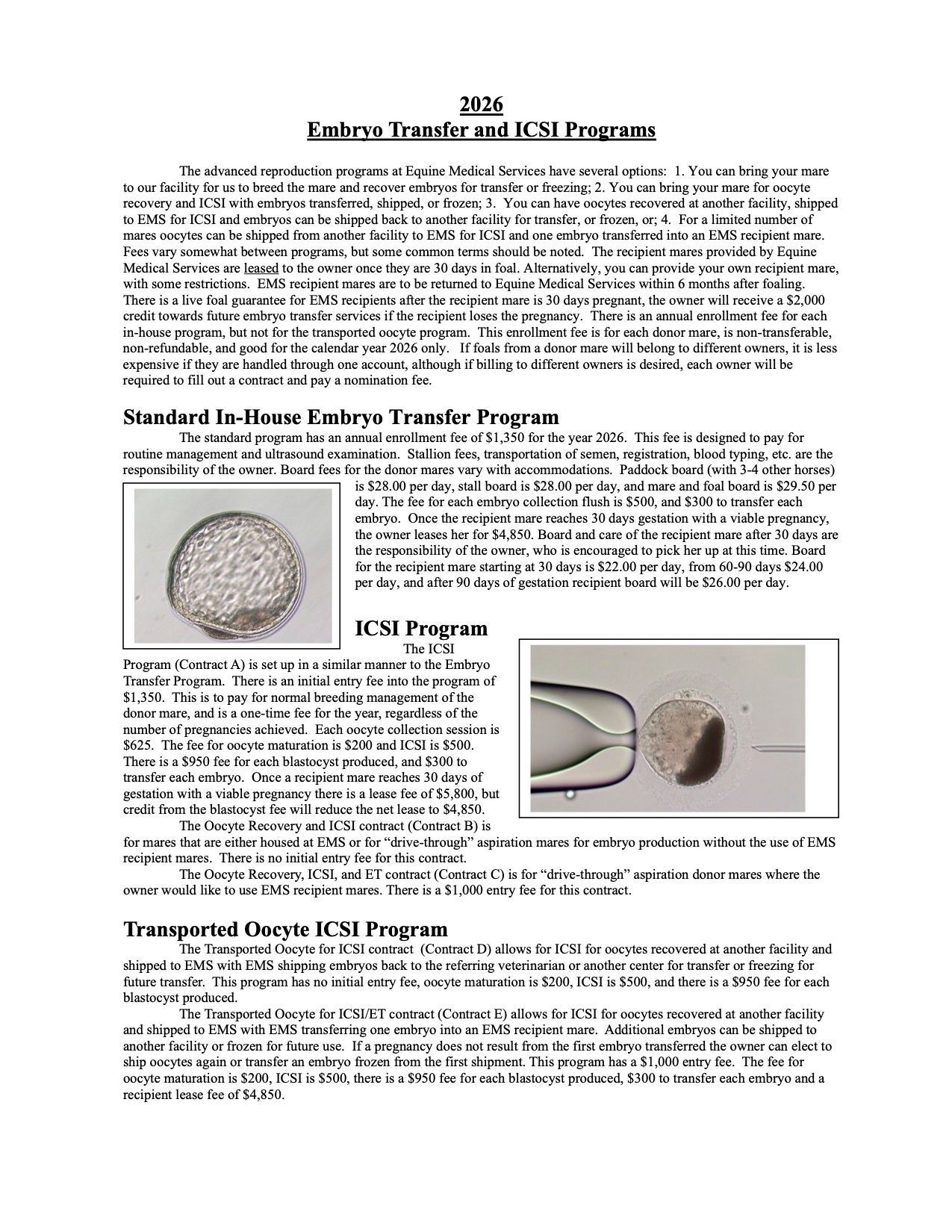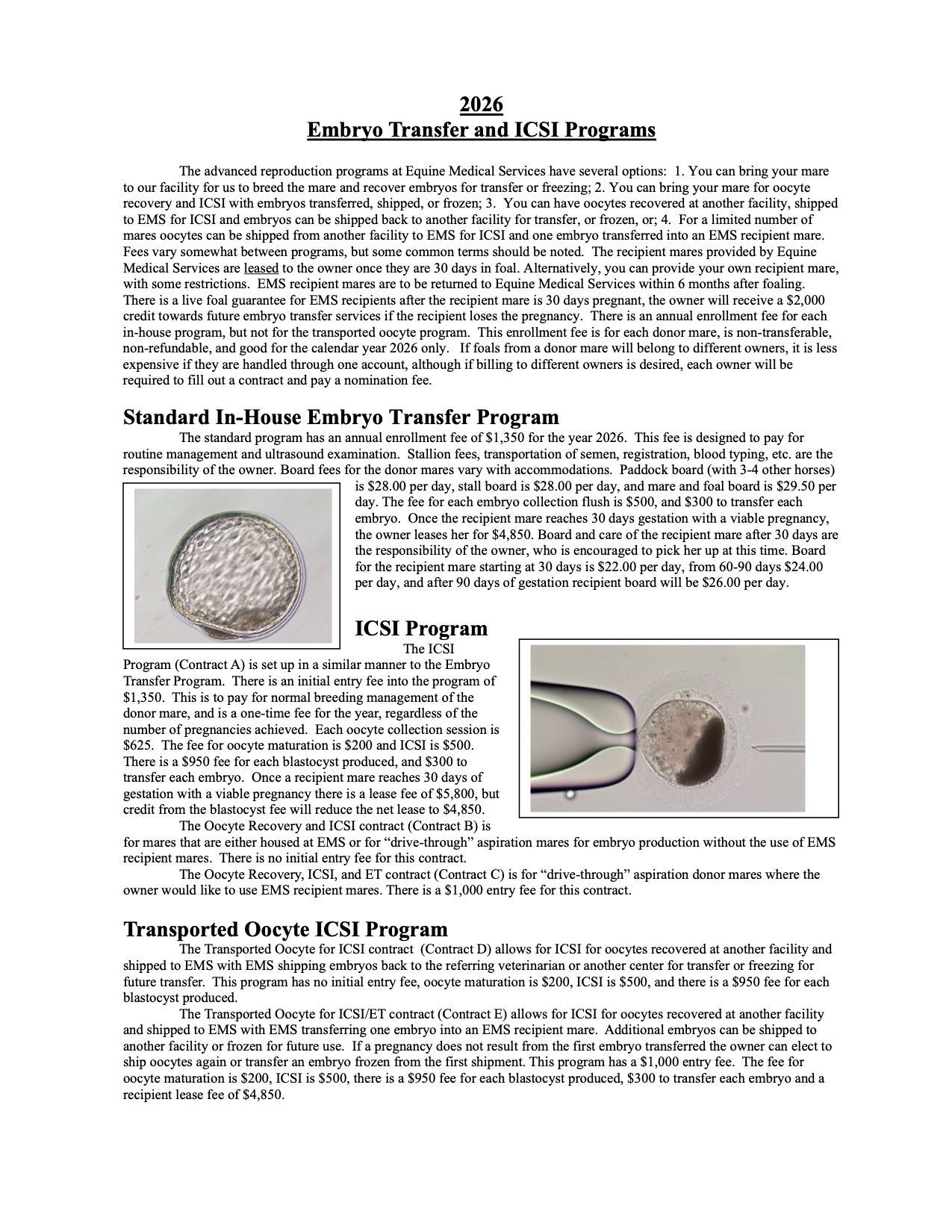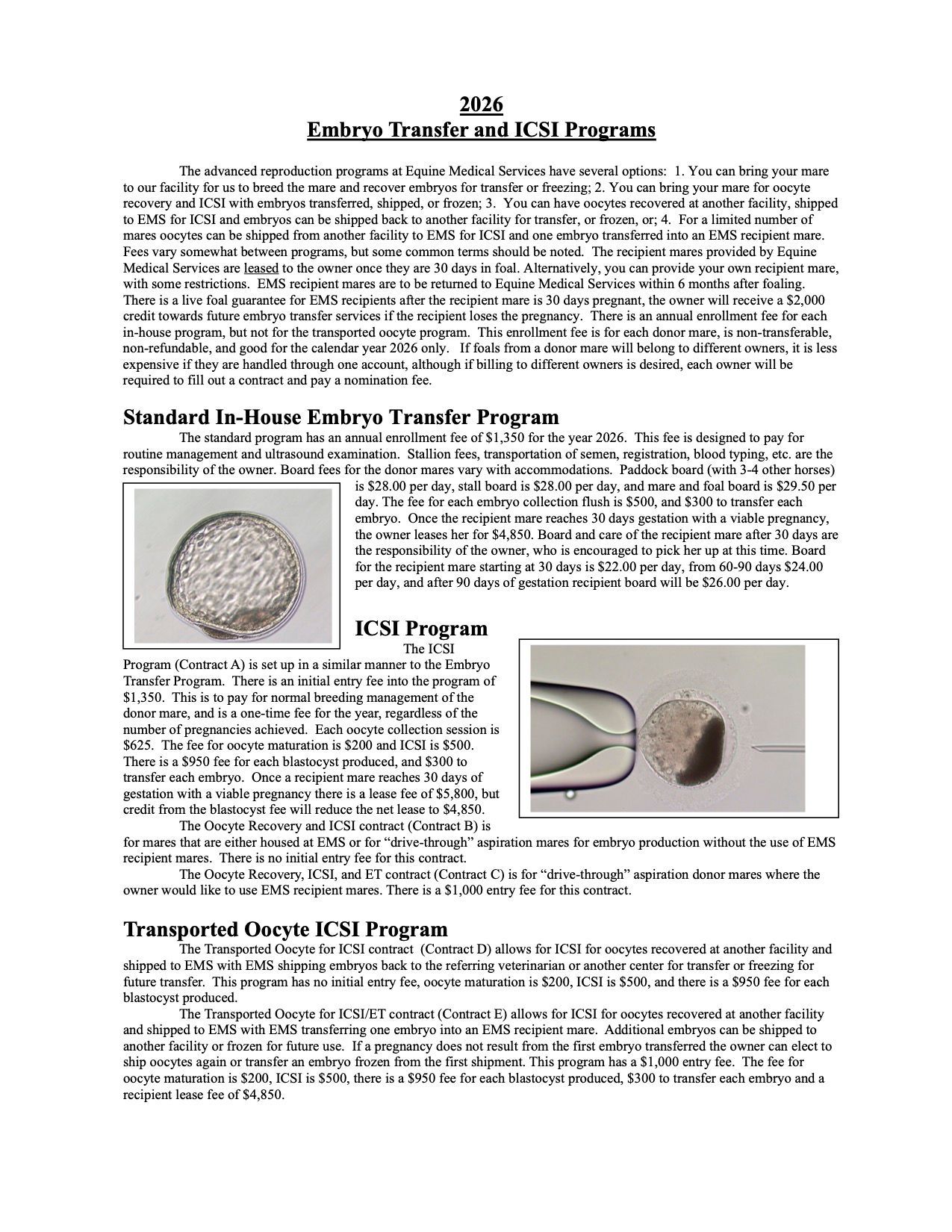ICSI Explained
Equine Medical Services is one of the world’s leading producers of in-vitro embryos. Standard in-vitro fertilization procedures have proven to be challenging in horses, but Intracytoplasmic Sperm Injection (ICSI) can be very successful.
What is Intracytoplasmic Sperm Injection (ICSI)?
In the Intracytoplasmic Sperm Injection procedure, oocytes, or eggs, are collected from a donor mare’s follicles and cultured until maturity. Once mature, each oocyte is fertilized in our laboratory via micro-injection of a single sperm cell. The fertilized oocytes should start to divide to become embryos with the first cell division occurring 24-30 hours after sperm injection. The blastocyst stage is reached after seven to 10 days of culture in an incubator. The embryo can then be transferred to the uterus of a recipient mare, shipped to another facility for transfer or frozen for future use.
Common utilizations of ICSI are in mares with persistent fertility problems preventing embryo production and in stallions with limited sperm availability. Since only a single sperm cell is injected, ICSI can utilize very small quantities of frozen semen.
What to expect from the ICSI process
Recovery of an oocyte from a dominant follicle can be expected on approximately 75% of attempts. Immature oocytes can often be collected from smaller follicles at the same time. 70-80% of oocytes fertilized by Intracytoplasmic Sperm Injection typically divide and grow, and 20-30% of fertilized oocytes will grow in culture to the blastocyst stage for non-surgical transfer.
Oocyte quality and numbers tend to decline with the donor mare’s age, so older donors typically have lower success rates than younger mares. Overall oocyte numbers can be a limiting factor as well―some mares have many small follicles each cycle which facilitate the recovery of multiple oocytes, while others have only one or two follicles present in each cycle.
Current ICSI Embryo Production (January-December 2025)
| Oocytes | Maturation | Cleavage | Blastocysts | |
|---|---|---|---|---|
| In-House | 8,014 | 4,820 (60.1%) | 3,538 (73.4%) | 1,383 (28.9%) |
| Transported | 10,458 | 5,842 (55.9%) | 4,218 (72.2%) | 1,485 (25.4%) |
| Total | 18,472 | 10,662 (57.7%) | 7,756 (72.7%) | 2,868 (26.9%) |
Equine Medical Services Intracytoplasmic Sperm Injection Program
Equine Medical Service offers two primary options for our Intracytoplasmic Sperm Injection programs: you may bring your mare to our facility for management throughout the oocyte recovery and ICSI process, or you may have follicular aspiration performed at another facility and have the oocytes shipped to EMS for ICSI. There are also further options for using EMS recipients, your recipients, or recipients at another facility for embryo transfer.
New Paragraph
New Paragraph
Standard In-House ICSI Program (Contract A) with recipients: There is a $1,350 nomination fee for this program that allows for the use of potentially multiple recipient mares. The nomination fee covers normal breeding management of the donor mare, as well as maintenance and monitoring of suitable recipient mares. It is a one-time annual fee, regardless of the number of pregnancies achieved. Each oocyte collection session is $625; fees of $200 apply for oocyte maturation and $500 for ICSI sessions; $300 for the transfer of each embryo transferred into a Recipient Mare, and there is a $950 fee for each blastocyst produced. Once a recipient mare reaches 30 days of gestation with a viable pregnancy there is a lease fee of $4,850.
Oocyte Recovery and ICSI w/o recipient (Contract B): If you would like oocyte recovery and ICSI to be performed at EMS without the use of EMS recipient mares, there is no up front nomination fee. This program can be used for mares housed at EMS or for "Drive-through" aspirations.
Oocyte Recovery, ICSI, and ET with recipient (Contract C): is for "drive-through" aspiration donor mares where the owner would like to use EMS recipient mares. This contract allows for one embryo to be transferred into an EMS recipient mare. Additional embryos can be shipped to another facility or frozen for future use. If a pregnancy does not result from the first embryo transferred the owner can elect to aspirate the mare again or transfer an embryo frozen from the first shipment. There is a $1,000 entry fee for this contract.
Transported Oocyte for ICSI without recipient (Contract D): There is no initial entry fee for this program, in which EMS will freeze or ship the embryo back to the referring veterinarian for transfer. Oocyte maturation is $200, ICSI is $500 and a $950 fee applies for each resulting blastocyst.
Transported Oocyte ICSI/ET Program with recipient (Contract E) : The Transported Oocyte for ICSI/ET program allows for ICSI for oocytes recovered at another facility and shipped to EMS with EMS transferring one embryo into an EMS recipient mare. Additional embryos can be shipped to another facility or frozen for future use. If a pregnancy does not result from the first embryo transferred the owner can elect to ship oocytes again or transfer an embryo frozen from the first shipment. This program has a $1,000 entry fee. The fee for oocyte maturation is $200, ICSI is $500, there is a $950 fee for each blastocyst produced and a recipient lease fee of $4,850. This program is available on a limited basis.

